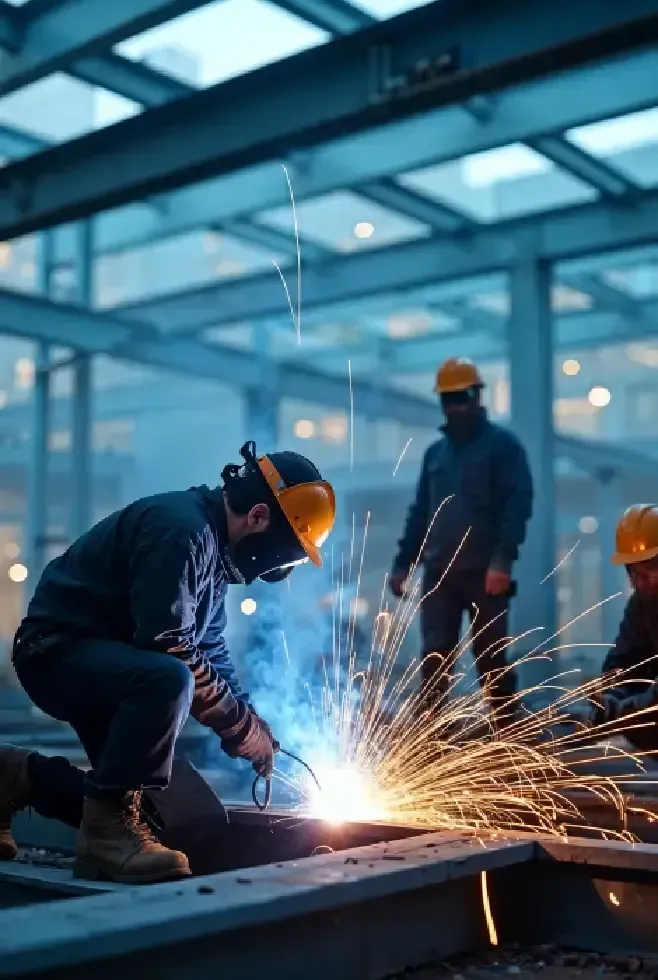blog

Structural Steel Welding Tips for Industrial Sites in Casper
Introduction
Structural steel is the backbone of many industrial facilities in Casper, from processing plants to fabrication yards and heavy equipment shops. Weld quality directly affects load support, safety, and long-term performance. The key to dependable structural welding is not just the skill of the welder, but also proper preparation, technique, and inspection practices tailored to field environments.
What Makes Structural Welding Different
Unlike decorative or light-gauge welding, structural welds are part of the building or equipment’s support system. They need to withstand vibration, temperature changes, equipment movement, and constant stress. Because of this, weld consistency and proper joint preparation are more important than speed.
Common Welding Processes for Structural Steel
Different welding methods are used depending on accessibility, steel thickness, and site conditions. Each has strengths that make it suitable for specific industrial situations.
Shielded Metal Arc Welding (Stick)
Stick welding performs reliably outdoors and in windy environments. It is commonly used for field repairs, thick steel sections, and remote access points where equipment mobility matters.
Flux-Cored Arc Welding (FCAW)
FCAW provides high deposition rates and strong welds. It’s efficient for structural assemblies and repetitive connections, especially when production speed matters on large projects.
Gas Metal Arc Welding (MIG)
MIG works best in controlled shop settings. It produces clean welds with minimal cleanup, making it ideal for pre-assembled components that will later be installed on-site.
Preparing Steel for Strong Welds
Good welds start with proper preparation. The steps below outline how to set up joints to ensure strong and consistent bonds.
Clean the weld area to remove rust, dirt, coatings, or scale
Align joints so load distribution is even and predictable
Check bevels or chamfers for full penetration welds
Secure the joint with clamps or fixtures to prevent shifting
Preheat thicker or low-temperature steel to reduce cracking risk
How to Maintain Weld Quality on Industrial Sites
Industrial environments introduce challenges that can affect weld consistency. Controlling the variables below helps maintain performance:
• Wind, moisture, and cold temperatures require shielding or pre-heat adjustments
• Travel speed and heat input should remain consistent across long seams
• Welders must use filler metals that match structural steel specifications
• Inspection should occur continuously, not only after completion
Where Field Welding Makes the Biggest Impact
Some industrial welding tasks are more efficient when completed on-site rather than transporting components back to a shop.
• Repairing structural supports without disassembling equipment
• Reinforcing beams and columns while work continues around them
• Modifying platforms, catwalks, or rail systems to match real usage
• Fixing heavy equipment frames that are impractical to haul
Inspection and Quality Verification
Weld inspection ensures the final joint meets load and safety requirements. Inspections may include visual checks, measurement of bead profile, or non-destructive testing depending on the project. The goal is to confirm consistent penetration, smooth transitions, and absence of defects like cracks or porosity that can weaken the structure.
Frequently Asked Questions
Why is joint fit-up so important?
Uneven gaps or misalignment can introduce stress and distortion, reducing weld strength.
Do structural welders need certifications?
Yes. Most projects require AWS or project-specific qualifications to verify skill and procedure accuracy.
How does cold weather affect welding?
Cold steel can cause cracking. Preheating the material raises its temperature enough to prevent brittle welds.
Can structural welds be repaired if a flaw is found?
Yes, but the defective weld must be removed and replaced following the approved welding procedure.
Is shop welding always better than field welding?
Not always. Shop welding offers controlled conditions, but field welding allows repairs and modifications without disassembly or transport delays.
Conclusion
Structural steel welding requires planning, control, and attention to conditions in the field. By selecting the right welding process, preparing joints correctly, and inspecting welds carefully, industrial sites in Casper can maintain strong, reliable structures and reduce downtime caused by failures or rework.
Our Services
Helpful Links
Contact Information
5734 W Old Yellowstone Hwy Casper WY 82604
Business Hours
Mon - Sun 8:00 am - 5:00 pm
with 24/7 call-out services
© 2025 All Rights Reserved | Frontier Welding & Fabrication, LLC
